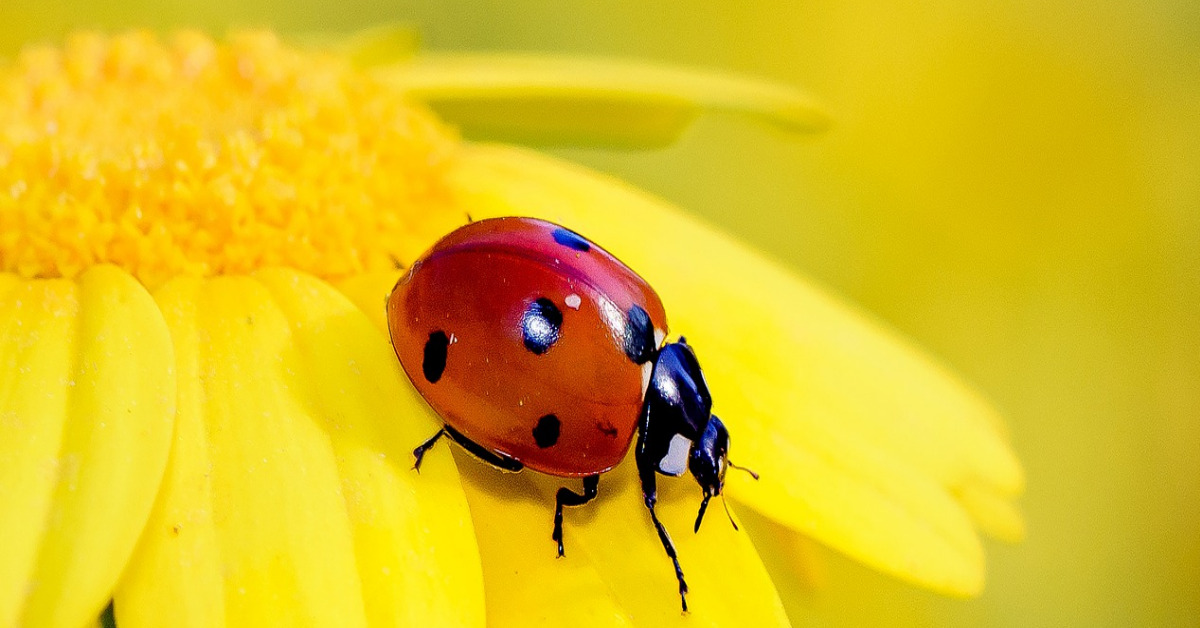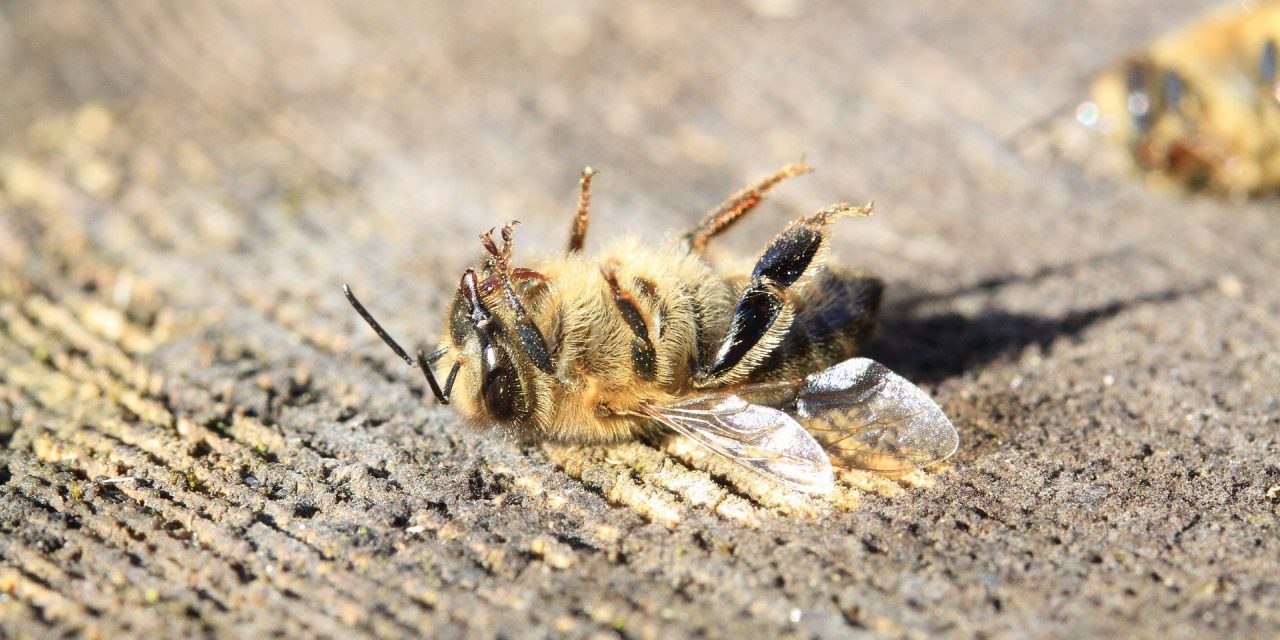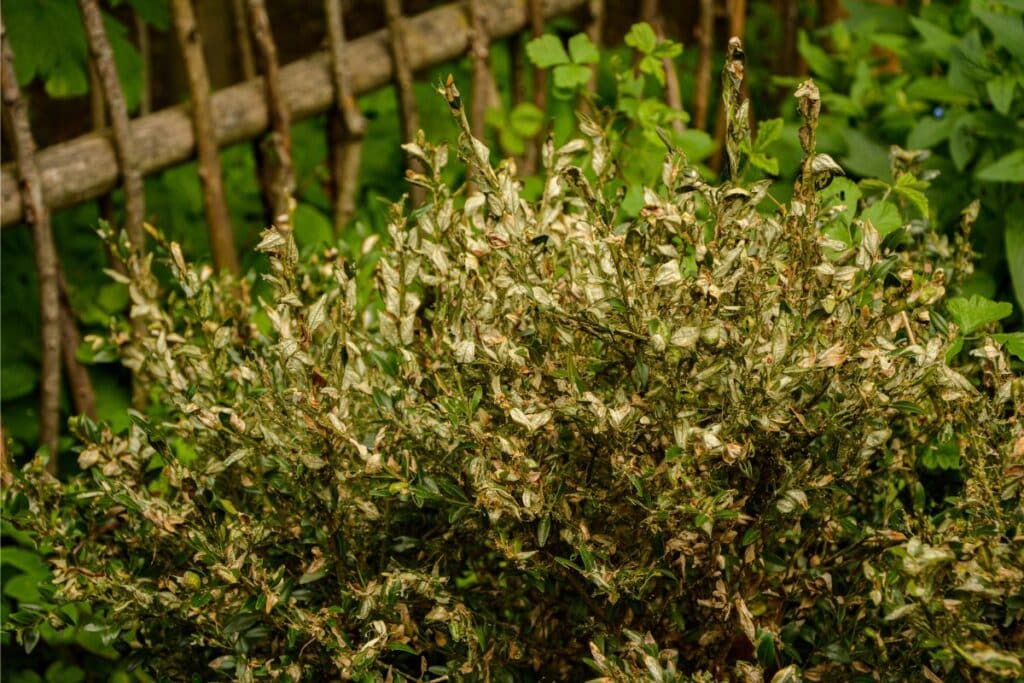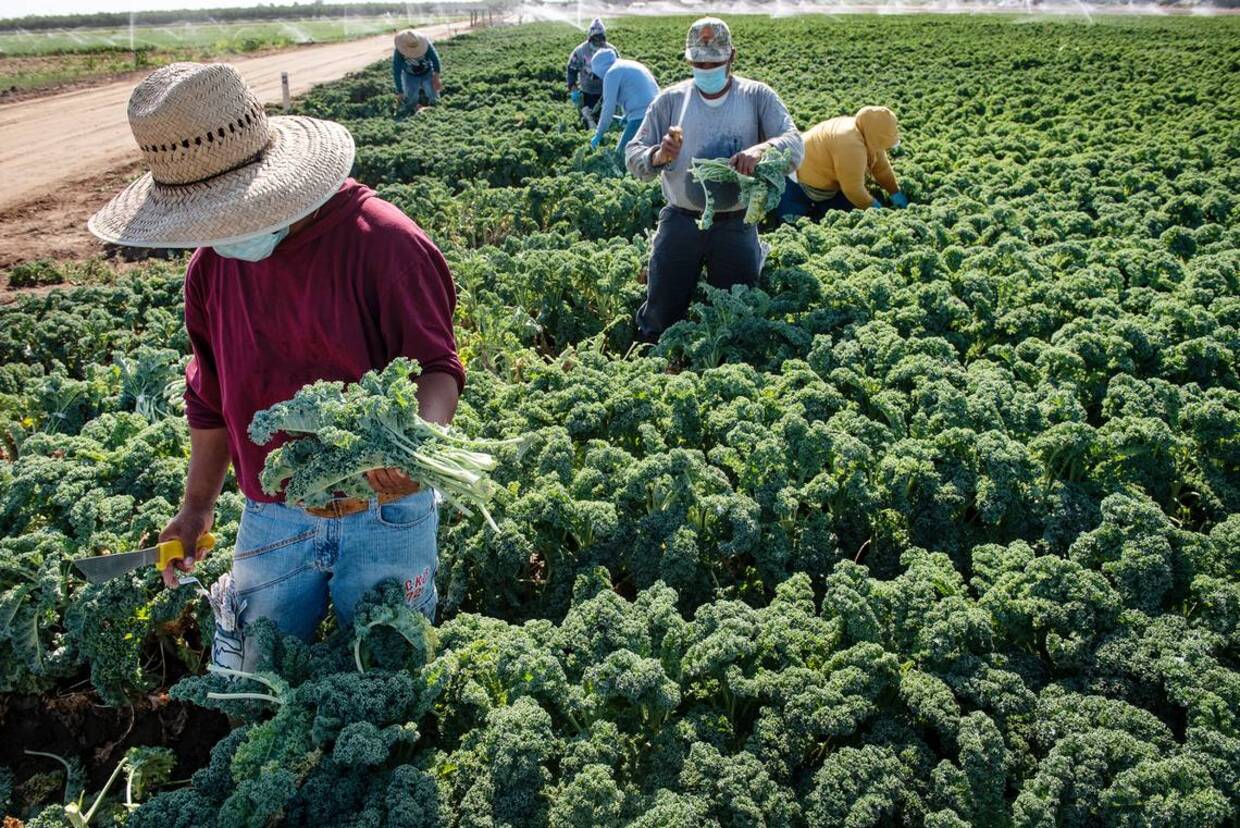Home>Gardening News and Trends>Latest News>What Would Happen If All Insects Died


Latest News
What Would Happen If All Insects Died
Published: December 10, 2023
Discover the latest news on the catastrophic consequences that could unfold if all insects were to disappear. Learn how our ecosystems would be disrupted and the profound impact it would have on our planet.
(Many of the links in this article redirect to a specific reviewed product. Your purchase of these products through affiliate links helps to generate commission for Chicagolandgardening.com, at no extra cost. Learn more)
Table of Contents
- Introduction
- Importance of Insects
- Ecological Effects of Insects’ Extinction
- Impact on Food Chains and Ecosystems
- Effects on Agriculture and Food Production
- Pollination Crisis
- Disease Control and Health Implications
- Decomposition and Nutrient Recycling
- Economic Consequences
- Alternatives and Potential Solutions
- Conclusion
Introduction
Insects, despite their small size, play a crucial role in the functioning of our planet. They are the most abundant and diverse group of animals on Earth, with over a million known species. From bees and butterflies to beetles and ants, insects are a vital part of ecosystems worldwide. However, have you ever wondered what would happen if all insects suddenly disappeared?
While it may seem far-fetched, the consequences of insect extinction would be far-reaching and catastrophic. Insects play a crucial role in various ecological processes, making their presence essential for the stability and balance of ecosystems. Their impact extends beyond the natural world, affecting humans and our way of life in numerous ways.
Throughout this article, we will delve into the importance of insects, explore the ecological effects of their extinction, and examine the implications for food chains, agriculture, disease control, nutrient recycling, and the economy. We will also consider potential alternatives and solutions to mitigate the dire consequences of a world without insects.
It is crucial to recognize that the purpose of this article is not to instill fear or alarm, but rather to highlight the significance of insects and the importance of their conservation. By understanding the interconnectedness of life on Earth, we can appreciate the intricate roles that insects play and take action to protect them and their habitats.
Importance of Insects
Insects are often overlooked and underestimated, but their importance cannot be overstated. They have a profound impact on ecosystems and human well-being. Let’s explore some key reasons why insects are so crucial:
- Biodiversity: Insects represent a significant portion of global biodiversity. Their incredible diversity contributes to the overall health and resilience of ecosystems. They interact with various organisms, including plants, animals, and microbes, making them essential for maintaining the delicate balance of nature.
- Pollination: Nearly 75% of flowering plants require insects for pollination. Bees, butterflies, and other pollinators transfer pollen from male to female flower parts, enabling plant reproduction. This process is vital for the production of fruits, seeds, and nuts, which form the foundation of many ecosystems and agricultural systems.
- Food Chains: Insects serve as a crucial food source for numerous other animals, including birds, reptiles, amphibians, and mammals. They occupy various trophic levels in food chains, ensuring energy transfer and sustaining predator-prey relationships. Without insects, the stability and diversity of ecosystems would be severely impacted.
- Nutrient Cycling: Insects play an essential role in decomposition and nutrient recycling. They break down organic matter, such as fallen leaves and dead animals, into smaller particles, facilitating the release of vital nutrients back into the soil. This process ensures the availability of nutrients for plants and supports the overall fertility of ecosystems.
- Natural Pest Control: Many insects are natural predators of agricultural pests. Ladybugs, lacewings, and parasitic wasps, to name a few, help control populations of harmful insects, reducing the need for chemical pesticides. This natural pest control is not only environmentally friendly but also vital for maintaining crop yields and ensuring food security.
- Scientific Research: Insects have immense value in scientific research and discovery. They have contributed to advancements in various fields, including genetics, medicine, and biomimicry. Their unique biological characteristics and adaptations provide valuable insights into evolutionary processes and serve as inspiration for technological innovations.
The importance of insects extends far beyond these points, but these examples highlight their indispensable role in the functioning of ecosystems and their significance for human societies. Understanding and appreciating the value of insects is crucial for their conservation and the preservation of the intricate web of life on our planet.
Ecological Effects of Insects’ Extinction
The extinction of insects would have profound ecological effects on our planet. These effects would ripple through ecosystems, disrupt the balance of nature, and lead to the degradation of numerous ecological services. Let’s explore some of the key ecological consequences of insect extinction:
- Disruption of Food Webs: Insects play a fundamental role in food chains, serving as a primary food source for many organisms. If insects were to disappear, the loss of this crucial energy and nutrient input would disrupt the entire food web. Predators that rely on insects for sustenance, such as birds, reptiles, and amphibians, would face food shortages, leading to population declines and potential extinctions.
- Decline in Predator-Prey Relationships: Insects interact with other animals as both predators and prey. Their absence would disrupt the delicate balance between predator and prey populations, leading to unstable ecosystems. Without insects as prey, predators would experience reduced food availability, leading to population declines and potential cascading effects throughout the food chain.
- Altered Plant Dynamics: Insects are vital for pollination, which is necessary for the reproduction of many plants. The loss of pollinators would result in reduced plant diversity and negatively impact ecosystem functioning. Additionally, some plants rely on specific insects for pollination, and their extinction could potentially lead to the decline or extinction of these plant species.
- Disrupted Nutrient Cycling: Insects play a crucial role in decomposition and nutrient recycling. Without them, the breakdown of organic matter would be significantly impaired, leading to a decline in nutrient availability for plants. This disruption in nutrient cycling would have cascading effects on the growth and survival of plants, ultimately impacting the overall health and stability of ecosystems.
- Increased Competition among Species: Insects also contribute to resource partitioning and reduce competition among species. They have specific ecological niches and perform unique roles in ecosystems. The absence of certain insect species would lead to increased competition for limited resources, potentially favoring certain species while disadvantaging others. This imbalance could disrupt the structure and functioning of ecosystems.
- Loss of Biodiversity: Insects make up a significant portion of global biodiversity. Their extinction would result in an irreplaceable loss of species diversity and genetic variation. The decline and loss of insect species would disrupt the complex interplay of organisms within ecosystems, leading to a decrease in overall biodiversity.
These ecological effects highlight the vital role that insects play in maintaining the health and functioning of ecosystems. The extinction of insects would have far-reaching consequences, impacting the delicate balance of nature and potentially jeopardizing the stability and sustainability of our planet.
Impact on Food Chains and Ecosystems
The extinction of insects would have a domino effect on food chains and ecosystems, causing disruptions and imbalances that could have dire consequences. Insects occupy various trophic levels and play critical roles as both predators and prey. Let’s explore the potential impacts of their extinction:
- Disruption in Trophic Interactions: Insects serve as a vital food source for many organisms, including birds, mammals, reptiles, and amphibians. If insects were to disappear, predator populations would experience food shortages, resulting in reduced reproduction rates and increased competition for limited resources. This disruption in trophic interactions would ripple throughout the food chain, leading to imbalances in ecosystem dynamics.
- Decline of Insectivorous Species: Insectivorous species, such as birds and mammals that depend on insects as their primary food source, would be severely impacted by the extinction of insects. These species would struggle to find alternative food sources, which could lead to population declines and, in extreme cases, extinction. Such losses would not only disrupt the balance of ecosystems but also impact the cultural and aesthetic values associated with these species.
- Reduced Predator Control on Pest Species: Many insects serve as natural predators, keeping populations of agricultural pests in check. Without insect predators, pest populations could explode, leading to crop damage and reduced agricultural yields. The reliance on chemical pesticides to compensate for the absence of natural pest control would have further adverse effects on the environment, including pollution and harm to non-target species.
- Impact on Plant-Pollinator Relationships: Insects, particularly bees, are crucial pollinators of many plant species. The loss of insect pollinators would result in reduced seed production and the decline or extinction of plant species that rely exclusively on insects for pollination. This loss of plant biodiversity would have cascading effects on other organisms that depend on these plants for food and habitat.
- Shifts in Species Abundance and Distribution: Without insects to regulate populations and provide ecological services, certain species may enjoy a competitive advantage over others. This could lead to the proliferation of certain species and the decline of others, causing shifts in the abundance and distribution of organisms within ecosystems. Such shifts could disrupt intricate ecological relationships and alter the overall structure and functioning of food chains and ecosystems.
- Loss of Ecosystem Services: Insects are integral to the provision of ecosystem services, such as pollination, nutrient recycling, and decomposition. The extinction of insects would result in the loss or significant reduction of these important services. This would have far-reaching consequences for the health and functioning of ecosystems, impacting their ability to provide resources and support human well-being.
The impact of insect extinction on food chains and ecosystems highlights the interconnectedness of all living organisms. Disruptions in trophic interactions and the loss of ecosystem services would have far-reaching consequences, causing imbalances and potentially jeopardizing the stability and resilience of ecosystems.
Effects on Agriculture and Food Production
The extinction of insects would have profound effects on agriculture and food production, as insects play a crucial role in the fertility and productivity of agricultural ecosystems. Let’s explore some of the potential impacts:
- Pollination Crisis: Insects, especially bees, are essential pollinators for many crops. Their role in transferring pollen from male to female flower parts enables fruit and seed development, contributing to agricultural productivity. The loss of insect pollinators would result in a pollination crisis, leading to decreased crop yields and quality, which could result in food shortages and higher food prices.
- Decreased Crop Yields: Insects are not only important for pollination but also for pest control. Many insects prey on agricultural pests, helping to keep their populations in check naturally. Without the regulation provided by these insect predators, pest populations would proliferate, leading to increased crop damage and decreased yields. Farmers would be forced to rely more heavily on chemical pesticides, posing environmental risks and increasing production costs.
- Loss of Biological Control: Insects play a critical role in biological pest control, acting as natural predators that keep pest populations in balance. Their extinction would undermine this natural form of pest management, leading to an overreliance on chemical pesticides. The increased use of pesticides can harm beneficial organisms, disrupt ecological balance, and contribute to environmental pollution.
- Impact on Agricultural Ecosystems: Insects are integral to the health and functioning of agricultural ecosystems. They contribute to nutrient cycling and decomposition, improving soil fertility and structure. The loss of insects would disrupt these ecosystem processes, negatively impacting soil health and reducing the overall resilience of agricultural ecosystems. This could result in decreased crop growth, increased vulnerability to pests and diseases, and a decline in long-term agricultural productivity.
- Shifts in Pest Dynamics: In the absence of natural predators, pests that were once controlled by insects may become more prevalent and problematic. Farmers would face significant challenges in managing these pests and controlling outbreaks, potentially requiring stronger chemical interventions. This would not only increase costs but also raise concerns about the sustainability and safety of agricultural practices.
- Threat to Food Security: The consequences of insect extinction on agriculture and food production would have severe implications for global food security. As crop yields decline and pest pressure increases, the availability and affordability of nutritious food could be compromised. Vulnerable populations already facing food insecurity would be disproportionately affected by these changes, exacerbating existing inequalities.
The effects of insect extinction on agriculture and food production demonstrate the dependency of human societies on the services provided by insects. Protecting and conserving insect populations is crucial for maintaining the productivity, sustainability, and resilience of agricultural systems and ensuring food security for current and future generations.
Pollination Crisis
One of the most significant consequences of insect extinction would be a pollination crisis. Insects, particularly bees, are vital pollinators for the reproduction of many flowering plants, including numerous crops. Their role in transferring pollen from the male to the female parts of flowers is essential for fruit and seed development. The loss of insect pollinators would have far-reaching implications for ecosystems and agricultural systems worldwide.
The pollination crisis would have profound effects on both wild plant populations and cultivated crops. Here are some key points to consider:
- Decline in Plant Diversity: Many plant species rely exclusively on insect pollinators for reproduction. Without these pollinators, the ability of these plants to produce seeds and fruits would be severely diminished. Over time, this could lead to a decline in plant diversity, affecting the resilience and stability of ecosystems. It could also result in the loss of certain plant species, disrupting intricate ecological relationships.
- Reduced Crop Yields: Insect pollinators play a crucial role in the production of many agricultural crops. Without their assistance, the yields and quality of these crops would significantly decline. A decline in crop pollination could result in reduced fruit set, abnormal fruit shapes, and poor seed development. Agricultural systems heavily reliant on insect pollinators, such as fruit orchards and vegetable farms, would be particularly vulnerable to lower yields and economic losses.
- Threat to Food Security and Nutrition: A significant portion of globally consumed food depends on insect pollination. Fruits, vegetables, nuts, and seeds that require insect pollinators for their production contribute to healthy diets and essential nutrients. The decline in crop yields caused by the pollination crisis could lead to food shortages, higher food prices, and a decrease in the availability of nutritious foods, posing a threat to food security and nutrition for human populations.
- Economic Impact on Agriculture: The decline in crop yields due to insufficient pollination would have economic implications for the agricultural sector. Farmers would face reduced incomes and profitability, as well as increased production costs due to the need for alternative pollination methods or the use of artificial pollination techniques such as hand-pollination. The additional expenses associated with these interventions could make farming less financially viable, especially for small-scale farmers.
- Disruption of Symbiotic Relationships: Insect pollinators have coevolved with plants in intricate symbiotic relationships. Likewise, some plant-pollinator interactions are highly specialized, with specific plants relying on certain insect species for pollination. The loss of these pollinators would disrupt these symbiotic relationships, potentially leading to declines or extinctions of both plant and pollinator species.
- Conservation Efforts and Alternatives: To mitigate the impact of the pollination crisis, conservation efforts must be implemented. Protecting and restoring pollinator habitats, reducing the use of pesticides harmful to pollinators, and raising awareness about the importance of pollinators are essential steps. Additionally, exploring alternative pollination methods, such as using managed bee colonies or introducing other pollinator species, may provide temporary solutions while long-term conservation strategies are developed and implemented.
The pollination crisis highlights the critical role that insect pollinators, particularly bees, play in maintaining the productivity and sustainability of ecosystems and agriculture. Addressing this crisis is not only crucial for food production but also for preserving biodiversity, ecosystem health, and the resilience of our planet’s ecosystems.
Disease Control and Health Implications
Insects play a vital role in disease control, both in natural ecosystems and human environments. Their extinction would have significant implications for disease dynamics and overall public health. Let’s explore some of the key points regarding disease control and the health implications of insect extinction:
- Vector-Borne Diseases: Many insect species, such as mosquitoes, flies, and ticks, act as vectors for various diseases. They transmit pathogens, including viruses, bacteria, and parasites, to humans and other animals. Without these insect vectors, the transmission of diseases such as malaria, dengue fever, Zika virus, Lyme disease, and many others would be significantly reduced. The extinction of insects could lead to a decrease in these vector-borne diseases in some regions.
- Imbalance in Pathogen Regulation: Insects not only transmit diseases but also regulate pathogen populations. Some insects, such as ants and termites, have antimicrobial properties that help control the spread of pathogens. The extinction of these insect species could disrupt this natural regulation, potentially resulting in an increase in pathogen transmission and the prevalence of infectious diseases.
- Impact on Disease Research and Drug Discovery: Insects have been invaluable in scientific research and drug discovery for combating diseases. They have served as model organisms for studying disease mechanisms, understanding host-pathogen interactions, and developing new treatments and drugs. The loss of these insect species would hinder progress in disease research and limit our ability to find solutions to emerging and existing health threats.
- Emerging Infectious Diseases: Insects often act as intermediate hosts or reservoirs for emerging infectious diseases. For instance, bats and mosquitoes are known to host viruses that can be transmitted to humans, causing diseases like Ebola, dengue, or West Nile fever. The decline or extinction of these insect species could disrupt the natural processes that enable the emergence and transmission of such diseases, potentially reducing the frequency of their occurrence.
- Impact on Ecosystem Health: Disease dynamics are intertwined with ecosystem health. Insects, as key components of ecosystems, contribute to the regulation of diseases by maintaining balanced populations of hosts, vectors, and pathogens. The loss of insects could disrupt this delicate balance, leading to unexpected shifts in disease patterns and potentially increasing the risk of disease outbreaks in certain ecosystems.
- Health and Well-being: Insects, such as butterflies and bees, have a positive impact on human well-being by providing aesthetic value and contributing to ecotherapy. Their disappearance could have psychological and emotional effects, as well as potentially impacting human mental health and quality of life.
The loss of insects would have complex and far-reaching implications for disease control and human health. It is crucial to recognize the vital role that insects play in disease regulation and to prioritize their conservation for the benefit of both ecosystems and human societies.
Decomposition and Nutrient Recycling
Insects play a critical role in decomposition and nutrient recycling, processes that are essential for the functioning and health of ecosystems. Their extinction would have significant consequences for these vital ecological processes. Let’s explore the importance of insects in decomposition and nutrient recycling:
- Organic Matter Breakdown: Insects are key contributors to the decomposition of organic matter. They feed on dead plant material, animal remains, and other organic waste, breaking them down into smaller particles. Through their feeding activities, insects accelerate the decomposition process, enabling the release of essential nutrients back into the environment.
- Nutrient Release: Insects aid in the release of nutrients from decomposing organic matter. They break down complex organic compounds into simpler forms, facilitating the release of vital nutrients such as nitrogen, phosphorus, and potassium. These nutrients are then made available to plants, supporting their growth and overall productivity.
- Soil Fertility: Insects contribute to the fertility of soils through their role in decomposition and nutrient recycling. By breaking down organic matter and releasing nutrients, they enhance soil fertility, helping to create a rich and nourishing environment for plant growth. The presence of insects is crucial for maintaining the health and productivity of agricultural soils and natural ecosystems.
- Enhanced Nutrient Cycling: Insects are not only involved in decomposition but also in the recycling of nutrients within ecosystems. Their feeding activities and the subsequent release of nutrients contribute to a continuous cycle of nutrient uptake, utilization, and return to the soil. This cycling ensures the availability of nutrients for plants and supports the overall functioning and dynamics of ecosystems.
- Impact on Plant Growth: The loss of insects involved in decomposition and nutrient recycling would have detrimental effects on plant growth and productivity. Without the recycling of nutrients from decomposing organic matter, plants would experience nutrient deficiencies, leading to stunted growth and reduced vigor. This would have cascading effects on the entire ecosystem, impacting plant communities, herbivores, and other organisms that rely on these plants for food and habitat.
- Effects on Detritus Food Chains: Insects are crucial in detritus food chains, which involve the breakdown of dead organic matter. They serve as food for other organisms, such as beetles, flies, and soil-dwelling invertebrates, that rely on decomposing matter for their nutrition. The extinction of insects would disrupt these detritus food chains, leading to changes in species abundances and potentially affecting the overall ecological balance.
The role of insects in decomposition and nutrient recycling cannot be overstated. Their extinction would significantly impact these essential ecological processes, leading to nutrient imbalances, decreased soil fertility, and disruptions in ecosystem dynamics. Recognizing and conserving the importance of these insect functions is crucial for maintaining healthy, functioning ecosystems.
Economic Consequences
The extinction of insects would have far-reaching economic consequences, affecting various sectors and industries that rely on the services and resources provided by insects. Let’s explore some of the key economic implications of insect extinction:
- Agricultural Losses: Agriculture is heavily dependent on insects for pollination, pest control, and nutrient recycling. The loss of insect pollinators would lead to decreased crop yields and reduced quality, resulting in significant economic losses for farmers and agricultural industries. Additionally, without natural pest control provided by insects, farmers would face higher costs associated with increased pesticide use and pest management practices.
- Food Prices and Availability: The decline in crop yields caused by the pollination crisis and the loss of pest control services would have direct impacts on food prices and availability. As production costs increase, farmers and food producers may pass these expenses onto consumers, leading to higher food prices. Reduced agricultural productivity could also result in food shortages and decreased access to diverse and nutritious foods, impacting food security and affordability.
- Ecotourism and Recreation: Insects contribute to ecotourism and recreational activities, attracting nature enthusiasts and providing unique experiences. Butterflies, bees, and other insects are often a major draw for tourists seeking to explore natural habitats. The decline or disappearance of these insects could lead to a decline in ecotourism, impacting local economies and businesses that depend on nature tourism.
- Loss of Biodiversity-Based Products: Insects are important sources of biodiversity-based products, including silk, honey, wax, and dyes. These products have both cultural and economic value, generating income and livelihoods for communities. The extinction of insect species could lead to a loss of these valuable resources and the industries that rely on them, impacting local economies and traditional practices.
- Impact on the Pharmaceutical Industry: Insects have contributed significantly to the discovery of new drugs and pharmaceutical compounds. Their unique biological characteristics and chemical components have been a source of inspiration and innovation in drug development. The loss of these insect species would limit the potential for new discoveries, potentially slowing down progress in the pharmaceutical industry and limiting future treatments and healthcare advancements.
- Ecosystem Services and Their Value: Insects provide invaluable ecosystem services, including pollination, nutrient cycling, and biological control. These services have economic value that is often unaccounted for in traditional economic models. the loss of these services would have far-reaching consequences, impacting the productivity and functioning of ecosystems and ultimately affecting various economic sectors that rely on these ecosystem services.
The economic consequences of insect extinction are varied and significant. Sectors such as agriculture, tourism, pharmaceuticals, and traditional industries would be most heavily affected. Recognizing the economic value of insects and their services is crucial for sustainable economic development and the conservation of these vital organisms.
Alternatives and Potential Solutions
While the extinction of insects would have severe consequences, there are alternatives and potential solutions that can help mitigate these impacts and promote the conservation of insect populations. Let’s explore some of these alternatives and potential solutions:
- Pollinator-Friendly Practices: Promoting the use of pollinator-friendly practices in agriculture is crucial for ensuring pollination and crop productivity. This can involve reducing pesticide use, providing habitat and nesting sites for pollinators, and planting diverse flowering plants to support pollinator populations.
- Conservation and Habitat Restoration: Protecting and restoring the habitats of insects is essential for their survival. Preserving natural areas, creating wildlife corridors, and planting native vegetation can provide crucial habitat for diverse insect populations. Urban areas can also contribute by creating green spaces and incorporating insect-friendly plants into landscaping practices.
- Reducing Chemical Pesticide Use: Minimizing the use of chemical pesticides and adopting integrated pest management (IPM) practices can help reduce harm to beneficial insects. IPM focuses on a combination of cultural, biological, and chemical control methods, prioritizing non-chemical alternatives while targeting harmful pests.
- Supporting Research and Monitoring: Investing in research and monitoring programs focused on insect populations and their ecological roles is essential for understanding their conservation needs and designing effective management strategies. This can include studying insect behavior, population dynamics, and the impacts of environmental factors on their survival.
- Education and Awareness: Raising public awareness about the importance of insects and the threats they face is crucial. Informing communities about the ecological roles of insects, promoting citizen science initiatives, and conducting educational campaigns contribute to fostering a greater appreciation and understanding of insects and their conservation needs.
- Exploring Alternative Pollination Methods: In cases where natural pollinators are scarce or absent, exploring alternative pollination methods can help ensure crop productivity. This can include the use of managed bee colonies and other pollinator species, as well as the development of innovative technologies for artificial pollination.
- Improving Waste Management: Proper waste management practices, such as composting and recycling, can help reduce the reliance on insect decomposition for organic waste breakdown. Utilizing sustainable waste management strategies can help minimize the disruption of nutrient recycling processes and maintain ecosystem health.
These alternatives and potential solutions require collaboration between governments, communities, industries, and individuals to address the challenges facing insect populations. By implementing these actions, we can work towards conserving and protecting insects, ensuring the critical services they provide to ecosystems and human societies are preserved for future generations.
Conclusion
The potential extinction of insects would have far-reaching and catastrophic consequences for our planet. Insects play critical roles in various ecological processes, including pollination, decomposition, nutrient recycling, and pest control. Their presence is vital for maintaining the balance and functioning of ecosystems, as well as for supporting agricultural productivity, disease control, and human well-being.
The ecological effects of insect extinction would disrupt food chains, alter plant dynamics, and jeopardize the stability and resilience of ecosystems. This would have cascading effects on biodiversity, agriculture, food production, disease control, and the economy.
However, there are alternatives and potential solutions available to mitigate these impacts and promote the conservation of insect populations. These include adopting pollinator-friendly practices, habitat restoration, reducing pesticide use, supporting research and monitoring efforts, promoting education and awareness, exploring alternative pollination methods, and improving waste management.
It is crucial that we recognize the importance of insects and take action to protect their populations and habitats. By doing so, we can uphold the delicate balance of nature, ensure food security, safeguard human health, preserve biodiversity, and promote sustainable and resilient ecosystems.
Preserving and conserving the incredible diversity of insects is not only an environmental imperative but also a moral and ethical responsibility. The interconnectedness of life on Earth reminds us that the well-being of insects is inseparable from our own well-being. Let us work together to create a future where insects thrive, ensuring a healthy and thriving planet for generations to come.





